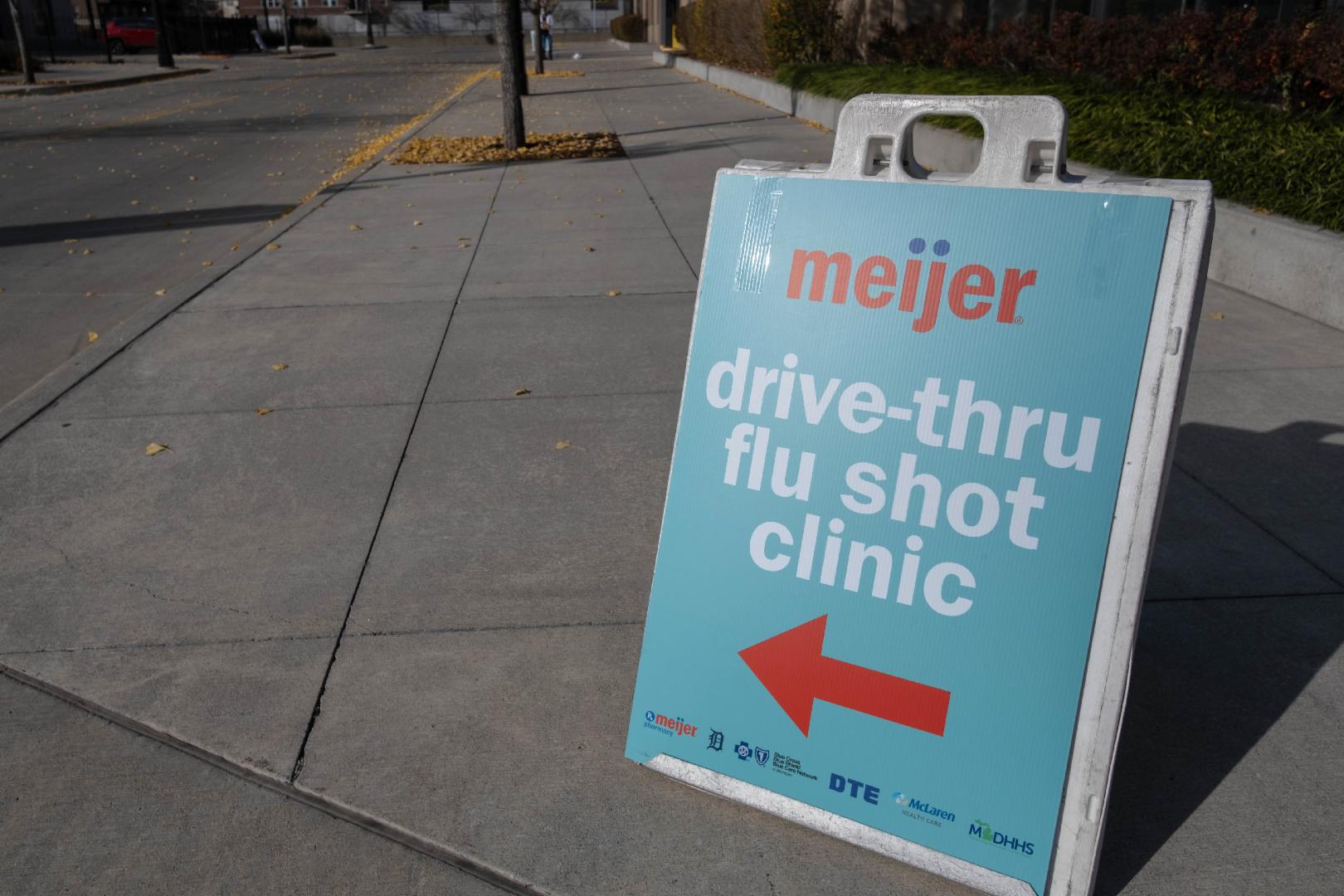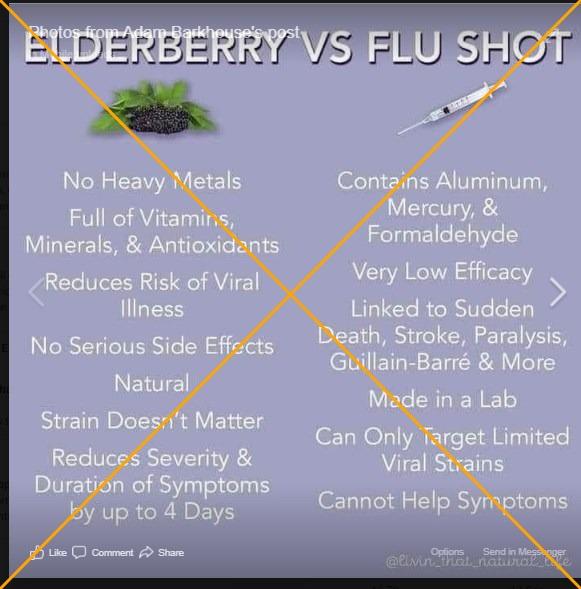
Elderberry is not a replacement for the flu shot
- This article is more than two years old.
- Published on October 24, 2023 at 23:11
- 3 min read
- By Marisha GOLDHAMER, AFP Canada
"ELDERBERRY VS FLU SHOT," says a September 9, 2023 Facebook post listing the purported benefits of elderberry and the downsides of the flu vaccine.

The image accumulated hundreds of shares on Facebook and Instagram as campaigns encouraging people to receive their annual flu shot ramped up in Canada and the United States.
Influenza is among the top 10 leading causes of death in Canada. Prior to the Covid-19 pandemic, the country reported approximately 12,200 hospitalizations and 3,500 flu deaths annually (archived here).
Health Canada and the US Centers for Disease Control and Prevention both recommend the jab for almost everyone six months and older. The vaccine is reformulated each year based on recommendations from the World Health Organization.
The efficacy of the shot does vary based on how well it matches the circulating strains -- but vaccination "can still provide protection even when there's a less-than-ideal match," Health Canada says on its website (archived here).
The posts repeat previously debunked claims about the risks associated with the flu vaccine while overstating the positive effects of elderberry, a dark purple berry that grows in much of Southern Ontario and other areas of eastern North America.
AFP took a closer look at some of the claims circulating online.
Flu shot ingredients
The posts mislead in saying the flu shot contains aluminum, mercury and formaldehyde.
In 2023, there are 10 influenza vaccines authorized and available for use in Canada (archived here). None of them list aluminum as an ingredient, and two of the authorized vaccines -- Supemtek and FluMist Quadrivalent -- do not contain any of the claimed components.
Four of the available shots -- Flulaval Tetra, Fluzone Quadrivalent, Afluria Tetra and Flucelvax Quadrivalent -- contain thimerosal, a mercury derivative used in multi-dose vials to preserve the vaccine.
Ian Gemmill, who served on Canada's National Advisory Committee on Immunization, told AFP in 2019: "The amount of thimerosal in the multi-dose vials is infinitesimal. It's been in use for decades."
He said there is no evidence of harm caused by the small dose. Additionally, patients can request a shot from a single-dose, prefilled syringe that does not contain thimerosal.
Formaldehyde, meanwhile, is sometimes used in the vaccine production process to inactivate a virus.
Five flu shots -- Flulaval Tetra, Fluzone Quadrivalent, Influvac Tetra, Fluzone High-Dose Quadrivalent, Fluad pediatric/Fluad -- contain trace amounts of the compound. But Natasha Crowcroft, a professor at the University of Toronto's Dalla Lana School of Public Health, told AFP in 2020 that the amount in a vaccine is far less than other natural sources of exposure.
"For example, pears include 50 times more formaldehyde than any vaccine," she said.
Adverse effects
Health Canada says it is common for people to experience injection site pain, fatigue or headache following flu vaccination, but these reactions are typically short-lived.
Serious adverse events -- including allergic reactions -- are rare.
The posts mention Guillain-Barre syndrome (GBS), characterized by a rapid onset of symptoms such as weakness in the lower limbs that can cause paralysis. The condition was first associated with the swine flu vaccine administered in the United States in 1976, but it is a rare side effect.
The Canadian Immunization Guide says studies have shown the risk of suffering GBS within six weeks following an influenza illness is much greater than the risk from vaccination (archived here).
Elderberry for flu
Elderberry is regularly sold in cold and flu relief products, but only a small number of studies have examined the plant's potential to lessen symptoms -- and not all found it effective.
A 2019 study with 180 participants said: "Supplementation with elderberry was found to substantially reduce upper respiratory symptoms" (archived here).
But a study published in 2020 (archived here) found no difference in the severity or duration of flu symptoms between patients given elderberry or a placebo.
There are also safety risks associated with the plant.
Raw berries and other parts of the tree contain toxic substances, according to the US National Center for Complementary and Integrative Health.
"Little is known about whether it's safe to use elderberry during pregnancy or while breastfeeding," the agency says on its website (archived here).
Krupa Playforth, a pediatrician in the US state of Virginia, says on her website (archived here) that evidence supporting the plant's effectiveness against the flu is not "robust." She also advises parents to purchase elderberry from a "reputable company," as incorrectly prepared products can cause cyanide poisoning.
Playforth sums up her advice in an August 29 Facebook post (archived here), saying if people choose to use elderberry they must "recognize that it cannot replace other known methods of preventing illness & supporting immunity: immunizations (esp against flu!), handwashing, etc."
AFP has debunked other vaccine misinformation here.
Copyright © AFP 2017-2026. Any commercial use of this content requires a subscription. Click here to find out more.
Is there content that you would like AFP to fact-check? Get in touch.
Contact us
